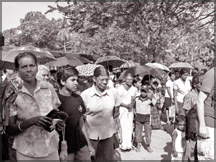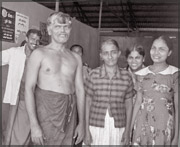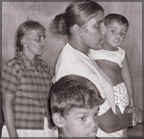|
DAILY NEWS ONLINE |
|
|
|
OTHER EDITIONS |
|
|
|
|
|
|
|
|
|
OTHER LINKS |
|
|
|
|
|
|
  |
One year after, all's not lost for themInoka - a 12-year-old girl attending the Primary School of Tangalle - gazes sadly at the sky as she meets visitors from Colombo - in her temporary shelter. The December 26 tsunami last year washed away all her cherished dreams. Her house was located just a few metres away from the sea.
One year after the catastrophe struck the coast near her home at Madaketiya, Inoka terribly misses her mother and two siblings who lost their lives on that fateful day. Although the tsunami itself didn't last long - not more than 20 minutes - it took away everything Inoka had loved - half her family, her house and her books. Now, thanks to many donors, Inoka has been able to restart her life from the temporary camp - in a cramped room to be exact - located at a dilapidated powerloom house in Tangalle. Her father, Nenda (aunt) and two other siblings all live in this tiny room along with their remaining belonging. However, Inoka's life is still unsettled as she misses her mother, siblings and home. When her father, who is a fisherman, goes out for the day to make a living, Inoka's life becomes dull and empty. To overcome her sadness, she plays with other children in the camp.
Yet she is still keen on attending school. "I want to be a teacher some day," says Inoka, still gazing at the sky. To make her dreams come true, she yearns to move into their new house, which has been pledged by Plan Sri Lanka, a child-centred community development organisation. Inoka says she is tired of living in the cramped, temporary camp where there are no facilities. The powerloom building has a 'Takaran' (metal roofing sheets) roof and tiny, compact rooms in which four or five people are forced to live. "The rooms are really hot and we have no space even to breathe some fresh air, unless I go out to the garden to play," complains Inoka, as she shows visitors her unpleasant living conditions.
Together with Inoka's family, many others are to receive new houses at Plan Sri Lanka's housing village that is being built in Yayawatte in Tangalle. The eight families remaining in this temporary camp are a section of recipients of Plan houses. At the beginning there were 31 families in this camp. Others have already moved into new housing units constructed by various institutions. Another temporary resident in the camp, Nirosha Kumari (26) says that her family is very pleased to move into Yayawatte once the project is completed early next year. Nirosha also lived in a sea front house when the tsunami struck. She lost her six-year-old daughter to the tsunami. In her tiny room in the camp, there are three framed pictures of her daughter with garlands. A foreign donor had given them two beds.
Her husband Neil Ravindra is a fisherman who has just restarted his vocation. But he does not have his own fishing nets yet and hires a net at present. However, the couple is anxious to go into the new house. They say that they are tired of living in the temporary house for nearly a year. Another resident, Dayawathi, is a mother of two - a 23-year-old son and a 22-year-old daughter. Both are unemployed. An immigrant from Ratnapura, she lived in a house by the beach when the tsunami struck. She lost her house and all her belongings. Dayawathi anyway had been living a hard life with her two children in the coastal village, as she has no husband to look after the family. Her husband was killed during the insurgency in the late 1980s. Her eldest son makes a small income as a fisherman. But his income is not regular, as he does not own a boat or fishing net. Dayawathi will be a recipient of a new house constructed by Plan. However, a house is not her only requirement at present. She wants to see her young children gainfully employed. Young Saroja and her husband also want to restart their livelihood and move into a new house. Her father, who supported them, died in the tsunami. Now her family lives with Saroja's mother and brother. All of them are yet to settle down with regular income earning jobs. Sunil Wijetunga, a fisherman, is loaded with responsibilities. He has four mouths to feed, although he is still unemployed. "We are happy to receive a house in the new project, and are waiting to see when we could go into the new house," he says. The intended beneficiaries of Yayawatte housing units said they like to move into this set of houses, because the Government convinced them that it would be a fully-fledged village with all facilities such as a community centre, a playground and many other benefits. The beneficiaries are getting houses on plots of eight to 10 perches as instructed by the Government. But they said the extent of land is not enough. "Our children also say that they need more space. We too would like to have more space in case we need to hold various functions such as weddings at home," a camp resident said. Plan Sri Lanka decided to build 200 housing units for the tsunami survivors, following a Government request and a suitable land was allocated for this purpose by the Government, where the Yayawatte project would be under way at present. The funding for the project has come from TUI, a leading travel company in Germany, and was co-ordinated by Plan Germany. Plan Sri Lanka's Country Director Myrna Mingming Evora says building a whole new village is a daunting task for any organisation. However, this project will be completed by May next year. The planning stage took a lot of time as many stakeholders, including the prospective owners, had to be consulted. As a result of these consultations, the number of rooms was increased to three from two, as children wanted separate rooms for the parents, male members and female members. At present the housing units are being constructed quite efficiently, having taken into consideration all environmental and social issues. This is to ensure many hundreds of children like Inoka - whose families would be receiving housing units in this village - to have a better and prosperous future. |
||||
|
|




